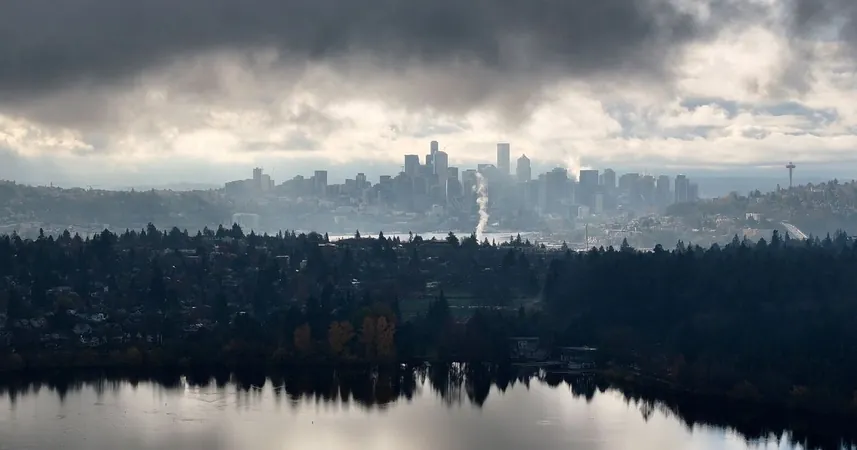
How to Tackle Family Questions About Seattle: From Rainfall to the CHOP Era!
2024-12-24
Author: Ken Lee
Ah, the holidays!
A time for cherished family gatherings, joyful celebrations, and, let’s not forget, an avalanche of questions. If you're a resident of Seattle, the inquiries can often take an interesting turn — typically starting with that unpredictable weather and spiraling into topics that might leave you exasperated.
"Isn’t it always raining in Seattle?"
Let’s clear this up: despite the city’s notorious reputation for rain, it isn’t the rainiest city in the U.S. In fact, between 1991 and 2020, Seattle averaged just 39.3 inches of precipitation per year, overshadowed by Miami's 66.9 inches and Baton Rouge's 61.9 inches. The reason Seattle feels so drizzly is its frequency of rainy days, averaging 156 per year—much more than Miami’s 126 and Baton Rouge’s 110.
Interestingly, Washington state hosts even rainier locales! Places like Aberdeen and Forks see annual rainfall averages of 87 inches and 121.1 inches, respectively, making Seattle seem mild in comparison. With plenty of cozy cafes and indoor activities available, Seattle residents have multiple ways to enjoy life despite the rain—whether that’s sipping a hot brew or unwinding in one of the city’s many spas.
"Are you worried about crime in Seattle?"
The truth might surprise your family. While crime can feel pervasive, Seattle has seen a decrease in violent crime this year, with 683 incidents per 100,000 people compared to 742 in 2022. Property crimes also hit a historic low last year. However, issues like shootings and homicides remain a concern, with data showing a significant uptick compared to pre-pandemic years.
Still, as part of King County, Seattle boasts one of the lower homicide rates among major U.S. counties, accentuated by the fact that it had only 5.2 homicides per 100,000 people in 2022—sobering stats when you compare them to cities like St. Louis (57.2) or Baltimore (44.7).
So how to ease your family's anxiety? A simple, “Crime is manageable, and Seattle is relatively safe!” followed by a request for the gravy may suffice.
"What actually happened with the CHOP?"
This topic may leave you scratching your head, but it’s essential to set the record straight. In June 2020, the Seattle Police Department turned a blind eye to protests following George Floyd’s tragic death. The Capitol Hill Autonomous Zone (later renamed CHOP) emerged, capturing nationwide attention.
After a month of protests that began peacefully with artistic expression and collective community aid, reports of violence began to cloud public sentiment, prompting police intervention on July 1, 2020. The city cleared the area just days later, resulting in payouts to businesses affected. The fallout continues to echo in conversations about the city today.
"What’s with the ‘Seattle Freeze’?"
Ask any Seattleite about the so-called “Seattle Freeze” and you’ll either get eye-rolls or enthusiastic debate. Is it a genuine phenomenon, or merely folklore? A 2019 survey indicated that 40% of locals don’t prioritize making new friends, which could indeed fuel this chilling perception. Seasonal affective disorder could also play a role, as residents grapple with dreary winter months.
If you’re aiming to break the ice—figuratively, of course—experts recommend simple gestures like saying “hello,” engaging in regular social activities, or maintaining a workout routine. After all, despite the city's quirks, it’s all about camaraderie, which can often melt away any perceived freezes.
Conclusion
As you navigate these family inquiries, remember that your experiences can help paint a more holistic picture of life in Seattle—beyond the weather, crime rates, or past protests. And who knows, maybe your inquisitive relatives will walk away with a new appreciation for the Emerald City!





 Brasil (PT)
Brasil (PT)
 Canada (EN)
Canada (EN)
 Chile (ES)
Chile (ES)
 España (ES)
España (ES)
 France (FR)
France (FR)
 Hong Kong (EN)
Hong Kong (EN)
 Italia (IT)
Italia (IT)
 日本 (JA)
日本 (JA)
 Magyarország (HU)
Magyarország (HU)
 Norge (NO)
Norge (NO)
 Polska (PL)
Polska (PL)
 Schweiz (DE)
Schweiz (DE)
 Singapore (EN)
Singapore (EN)
 Sverige (SV)
Sverige (SV)
 Suomi (FI)
Suomi (FI)
 Türkiye (TR)
Türkiye (TR)